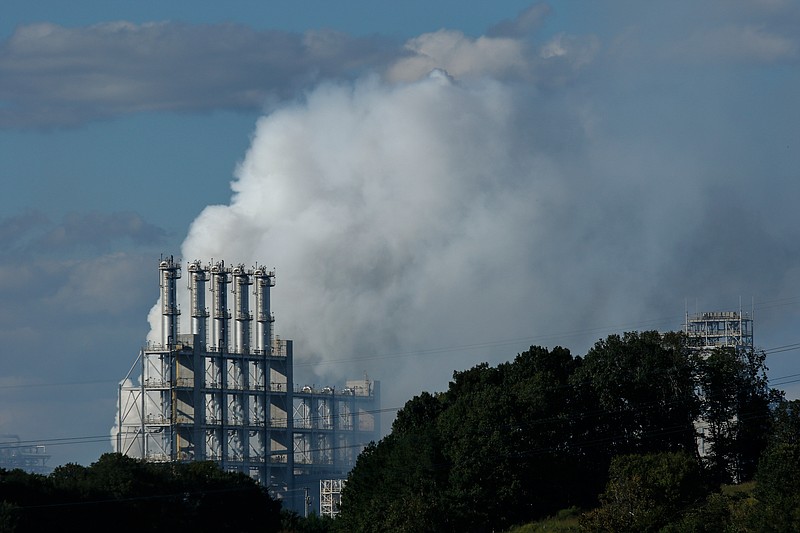In April 2016, a Times Free Press front page story and pictures showed Wacker polysilicon chemical officials and Tennessee politicians cutting a thick red ribbon at the $2.5 billion plant's opening. Wacker officials even announced that they would soon start work to build a second plant adjacent to the new Charleston, Tenn., facility just 45 miles northeast of Chattanooga.
On Friday, almost a year and a half later, Wacker was again on our front page - this time with a white vapor plume rising from the plant beside a headline reading "Wacker blast spews gas; Plant sustains second incident within 8 days."
An explosion at the plant involved a chemical called chlorosilane and released hydrochloric acid. Hazardous materials emergency responders closed down nearby roads and Interstate 75, forced nearby residents and school students within a 1.5-mile radius to "shelter in place" with closed windows and switched off heat and air conditioning units.
Area 911 dispatchers reported that people called experiencing skin burning sensations and difficulty breathing, and eight people went to hospitals with symptoms related to the incident.
In a news release, Wacker officials made light of the blast and the long-lasting plume. They termed the day's event as a "mechanical incident [that] resulted in a hydrogen chemical release. "The statement claimed that the cloud appeared to be steam, and that air quality being tested by Wacker was at a safe level. There was no danger to the public, they said.
Steam, by the way, is mostly invisible and certainly not long-lasting.
On video, Wacker Vice President and site manager Mary-Beth Hudson said she did not know why people had to be treated for irritation despite officials saying there was no threat to safety.
"I don't know that we can speculate why they went to the hospital," she said.
But Troy Spence, director of the Bradley County Emergency Management Agency, in that same video, said, "We do know that the vapor was HCl."
HCl is the chemical formula of hydrogen chloride and hydrochloric acid. At room temperature, hydrogen chloride is a colorless to slightly yellow, corrosive, nonflammable gas that is heavier than air and has a strong irritating odor. On exposure to air, hydrogen chloride forms dense white corrosive vapors, and inhalation of the fumes can cause coughing, choking, inflammation of the nose, throat, and upper respiratory tract, and in severe cases, pulmonary edema, circulatory system failure, and death, according to the Agency for Toxic Substances & Disease Registry, a federal public health agency of the U.S. Department of Health and Human Services.
Both hydrogen chloride gas and hydrochloric acid are important in technology and industry, but ATSDR says skin contact with the gas can cause redness, pain, and severe skin burns. Hydrogen chloride may cause severe burns to the eye and permanent eye damage. EPA rates and regulates the gas as a toxic substance.
Just over a week before, five plant workers were hospitalized with chemical burns. The newspaper has been unable to determine what happened or what their conditions may be now.
This is unacceptable.
The people of Charleston spent several terrorized hours Thursday, and they deserve complete transparency from this company about what happened, and what could have happened. Residents do not deserve to be told - in effect - that nothing happened.
The plant manufactures hyperpure polysilicon in the making of solar panels, but already it has a spotty history.
Records from the Tennessee Occupational Safety and Health Administration show Wacker was cited for dangerous working conditions in the spring and summer of 2016 and fined $8,500. In October, a faulty gasket in a distillation device released a small cloud of chemicals, but no one was injured. Then there were the two incidents this year.
Chemicals can make our lives better, but they can also be dangerous.
What makes them more dangerous is pretending danger doesn't exist, or giving a middle finger to the public - as happened in the explosions at the flooded Arkema Chemical plant in Crosby, Texas, after Hurricane Harvey swamped an organic peroxides facility and emergency officials ordered evacuations in a 1.5-mile radius because the unrefrigerated chemicals there would (and did) inevitably explode.
The Arkema official wouldn't tell the public what chemicals were spewed in the black smoke that followed the explosions. He even declined to call it a chemical release. What's worse is that he had help from the Texas government that gives chemical companies legal cover to hide the locations of their EPA-regulated chemicals - despite a Congress-passed federal law known as the Community Right to Know Act.
That 1986 federal law requires companies with large stores of chemicals onsite to report on the storage location, use and releases of hazardous substances to federal, state and local governments and to readily provide that information to homeowners, the media and emergency responders. The law was passed on the heels of a 1984 cyanide gas leak at a U.S. multinational Union Carbide Corp plant in Bhopal, India, that killed thousands. The law orders each plant's chemical reports be compiled in a publicly accessible database every two years. The most recent available is from 2015. Wacker didn't open until 2016 - so the Bradley County public can't look for help there.
Accidents happen. Natural disasters happen.
But neither should give corporate officials the right to stonewall their neighbors.
We and our Bradley neighbors must make sure that our Tennessee elected officials and our corporate leaders don't try to make end runs around the very common-sense Community Right-to-Know Act. And we must make it plain that they owe us the respect of straight, direct and honest information.
